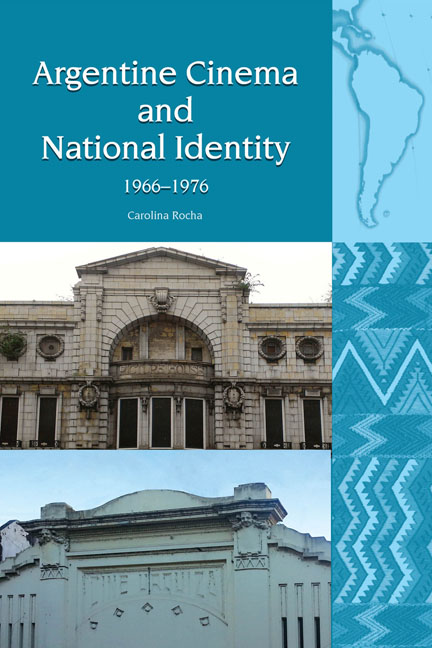Book contents
- Frontmatter
- In Memory of Paulina Piselli (1937–2017)
- Contents
- Acknowledgements
- Introduction
- Section I Argentine History and National Cinema, 1955–1976
- Section II The Cinematic Gauchesque
- 5 Martín Fierro
- 6 Don Segundo Sombra
- 7 Santos Vega
- 8 Juan Moreira
- 9 Los gauchos judíos
- Section III Representing Founding Fathers
- Conclusion
- Bibliography
- Index
8 - Juan Moreira
from Section II - The Cinematic Gauchesque
- Frontmatter
- In Memory of Paulina Piselli (1937–2017)
- Contents
- Acknowledgements
- Introduction
- Section I Argentine History and National Cinema, 1955–1976
- Section II The Cinematic Gauchesque
- 5 Martín Fierro
- 6 Don Segundo Sombra
- 7 Santos Vega
- 8 Juan Moreira
- 9 Los gauchos judíos
- Section III Representing Founding Fathers
- Conclusion
- Bibliography
- Index
Summary
Preproduction for Juan Moreira took a long time. The film was first announced in October 1966, when director-producer Héctor Olivera anticipated its shooting with Leonardo Favio as director and Alcón as the protagonist (‘1967 puede,’ 1967, 16). In February 1969, Favio announced that he would start shooting Moreira in color, with many actors including the Japanese Toshiro Mifune (1920–1997) (Mactas, 1969, 18). The delay resulted in a change: the main role was offered to actor Rodolfo Bebán. In an interview from May 1972, Favio mentioned that shooting was set to start on May 29, stating that ‘esta película no es más a menos épica, Juan Moreira es testimonial y, desgraciadamente, también de mucha actualidad. Moreira es el principio de una época, también de una raza y, por qué no de una mentalidad’ [this film is not more or less an epic, Juan Moreira is symbolic and, unfortunately, also very current. Moreira is the start of an epoch, of a race too and, why not, a mentality as well] (‘Favio ya tiene,’ 1972, non. pag.). The film was supposed to be released on October 11, 1972, but further delays meant that shooting finally began on June 12, 1972, in Lobos, Buenos Aires. The stages of the production were reported in the local press—particularly Gente—with numerous photos. The shoot finished at the end of October 1972. Juan Moreira was based on the adaptation of Eduardo Gutiérrez's nineteenth-century novel by Zuhair Jury, Favio's brother. It was produced by Alberto and Tito Hurovich, who joined forces with José Parada to create Centauro, a production company that agreed to invest 150 million pesos in Juan Moreira, whose total budget was 240 million pesos, making it the most expensive Argentine film ever (‘Su Juan,’ 1982, non. pag.). For Alberto Farina, Juan Moreira, shot in color, represents the beginning of a new phase in Favio's oeuvre: that of the cinema-spectacle (1993, 17).
Amid high expectations, Juan Moreira's opening was a veritable event. The film was released in the Atlas and Callao cinemas in downtown Buenos Aires, and another 50 movie theaters around the country, on May 24, 1973—the day before the inauguration of Héctor Cámpora (1909–1980), a Peronist who had won the national elections in March, which put an end to seven years of military government.
- Type
- Chapter
- Information
- Argentine Cinema and National Identity (1966–1976) , pp. 111 - 121Publisher: Liverpool University PressPrint publication year: 2018



